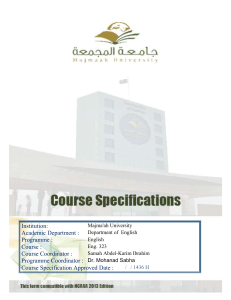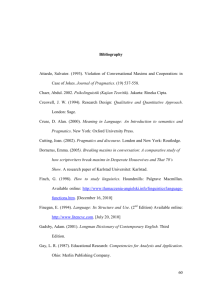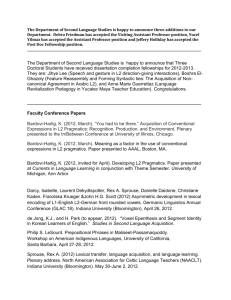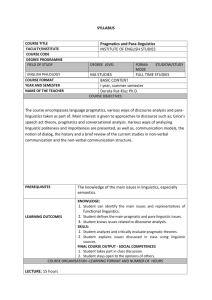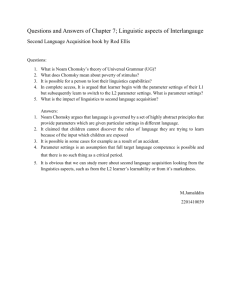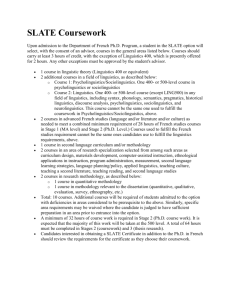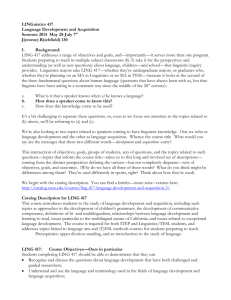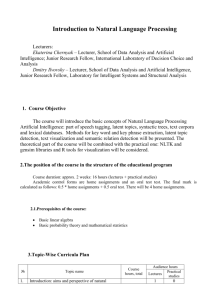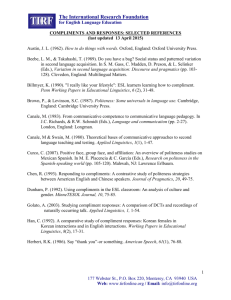3 - جامعة المجمعة
advertisement
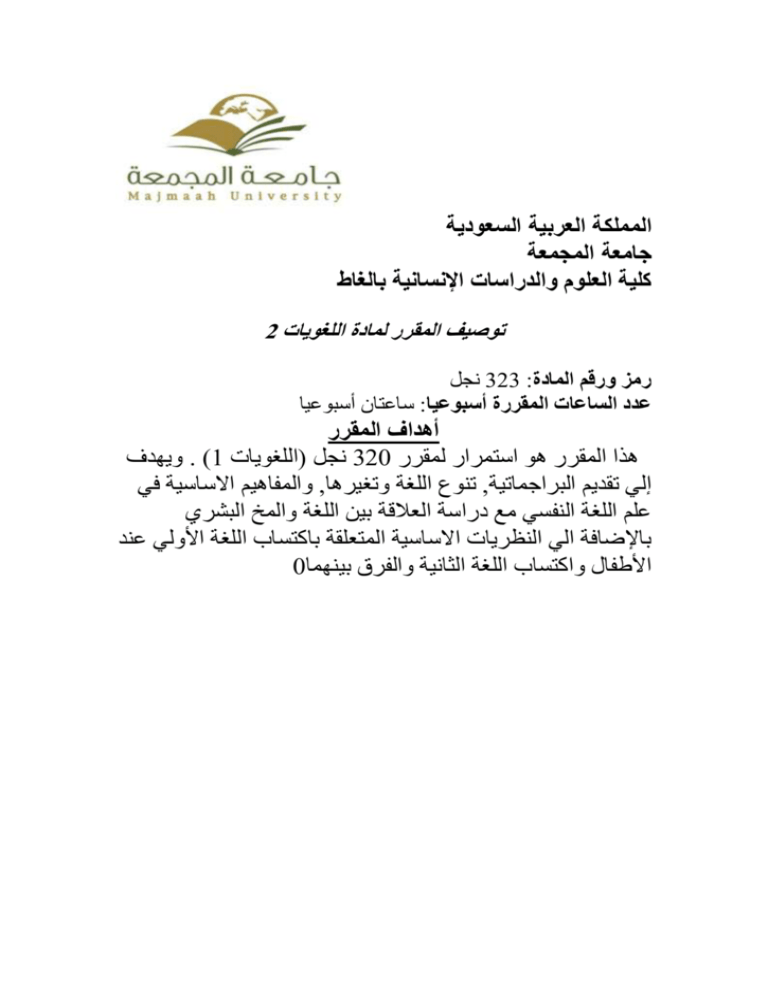
المملكة العربية السعودية جامعة المجمعة كلية العلوم والدراسات اإلنسانية بالغاط توصيف المقرر لمادة اللغويات 2 رمز ورقم المادة 333 :نجل عدد الساعات المقررة أسبوعيا :ساعتان أسبوعيا أهداف المقرر هذا المقرر هو استمرار لمقرر 333نجل (اللغويات . )1ويهدف إلي تقديم البراجماتية ,تنوع اللغة وتغيرها ,والمفاهيم االساسية في علم اللغة النفسي مع دراسة العالقة بين اللغة والمخ البشري باإلضافة الي النظريات االساسية المتعلقة باكتساب اللغة األولي عند األطفال واكتساب اللغة الثانية والفرق بينهما3 Kingdom of Saudi Arabia The National Commission for Academic Accreditation & Assessment COURSE SPECIFICATION Eng. 323 Linguistics II Revised 2011 Course Specification Institution: Majmaah University College: Faculty of Science & Humanities Department: English Department A Course Identification and General Information 1. Course title and code: Eng. 323 - Linguistics II 2. Credit hours:2 hours 3. Program(s) in which the course is offered. (If general elective available in many programs indicate this rather than list programs) B. A. in English 4. Name of faculty member responsible for the course Dr. Samah Abdel-karim Ibrahim 5. Level/year at which this course is offered: Level 4 / 2nd year 6. Pre-requisites for this course (if any) Preferably, Eng. 323. B. Objectives 1. Summary of the main learning outcomes for students enrolled in the course. Students will be able to: 1. Define the basic concepts of pragmatics 2. Apply the theoretical concepts of speech act theory, Grice’s maxims, and politeness theory to linguistic situations. 3. Explain the role of context in interpreting utterances in relation to speech acts, maxims, and politeness choices. 4. Define the basic concepts of psycholinguistics: language and the brain, 1st and second language acquisition. 5. Explain the relationship between language and the brain. 6. Explain basic issues related to first and second language acquisition. 7. Discuss the differences between first and second language acquisition C. Course Description This course, as a continuation to Eng. 320 (Linguistics I), constitutes part II of the introduction of students to the discipline of linguistics. It introduces the students to the areas of pragmatics, discourse analysis and psycholinguistics Topic No of Weeks Contact hours I. Introduction: 1hour II. Pragmatics: Context; Presupposition; Speech Acts.2weeks 4 hours Pragmatics: Politeness III. Pragmatics & Discourse Analysis: Interpreting 1 week 2 hours Discourse Speech events; The Cooperative principle; 3weeks6hours Hedges; Implicatures 1 week 2 hours IV.Psycholinguistics: Language and the brain 1st Language Acquisition 2nd Language Acquisition 2weeks 2weeks 1week 4hours 4hours 2hours VI. Review Week 1 week2 hours 2. Course components (total contact hours per semester): Lecture:25 hours Practical/Fieldwork: 5 hours a. Knowledge (i) Description of the knowledge to be acquired 1. Basic concepts in the areas of pragmatics, psycholinguistics, and sociolinguistics, 2. The nature of the discipline of linguistics, its branches, and its relations to other disciplines, such as sociology, psychology, and philosophy. 3. How language is used in context in view of the most important pragmatic theories: speech acts, Grice’s maxims, and politeness theory, and of how shared knowledge plays a role in the linguistic choices we make. 4. The relationship between language and the brain. 5. Introductory knowledge of basic issues related to language acquisition. (ii) Teaching strategies to be used to develop that knowledge 1. Lectures 2. Class discussion 3. Presentation (iii) Methods of assessment of knowledge acquired 1. Asking questions in the middle of lectures to see if students are following 2. Quizzes 3. In-term exams 4. Final exam b. Cognitive Skills (i) Cognitive skills to be developed 1. Perform simple linguistic analysis at the pragmatic level. 2. The ability to answer applications assignments and make use of the information from primary and secondary sources. 3. The ability to apply knowledge gained to examples from their native language. (ii) Teaching strategies to be used to develop these cognitive skills: 1- Lectures/teaching students how to think of language and deal with it objectively and descriptively. 2- Class discussions/teaching students to think independently and engage in group discussions. 3- Ask students in class to bring examples from languages other than English, Arabic for example. This enables them to apply the analytical tools on new data. 4- Give assignments where they have to solve problems based on theoretical knowledge gained. 5- Ask students to perform simple analysis on the whiteboard and guide them through. (iii) Methods of assessment of students’ cognitive skills: 1. Class participation 2. Assignments/ presentation 3. Midterms and quizzes 4. Final Examination c. Interpersonal Skills and Responsibility (i) Description of the interpersonal skills and capacity to carry responsibility to be developed: 1. Students can participate in class discussion and express their concern 2. Students can complete assignments in due time. 3. Students work in groups and act cooperatively. (ii) Teaching strategies to be used to develop these skills and abilities: 1. Encourage the students to take responsibility for their own learning. 2. Encourage students to ask questions. 3. Give group assignments. 4. Encourage class participation. 5. Advise students about of the significance of time management. Schedule of Assessment Tasks for Students During the Semester Assessment task Week due Proportion of Final Assessment Midterms 30% Quizzes and assignments and/or 2nd midterm throughout 10% Presentation 10% Final Exam 50% E. Learning Resources 1. Required Text(s) * Yule, G. (2006). The Study of Language, 3rd Edition. Cambridge: Cambridge University press.
